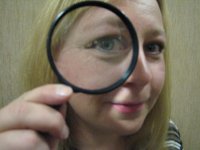What do historians do?
 Dr. Jennifer Pettit, Mount Royal University
Dr. Jennifer Pettit, Mount Royal UniversityHistorians love to solve mysteries, most of all. Contrary to popular belief, "Doing History" is not memorizing dates and names. That is all just context. "Doing History" is the work of the detective. Historians dig into the past -- a few years or a few thousand years -- to solve cold cases, to answer questions and solve puzzles. Sometimes these are small intriguing mysteries that explain the past to us, like “Who Killed William Robinson?” on this website. Other times they are monumental questions we need to answer to move securely into the future like: “why do the great empires always seem to rise and fall?” or “how has climate change affected the environment and human life in the ancient past?”
 Newspaper clipping reading: Jerome dead and his secret dies with him
Newspaper clipping reading: Jerome dead and his secret dies with himWhile not exactly like “Indiana Jones” of Raiders of the Lost Ark or of the Dr. Robert Langdon of the Da Vinci Code, the historian’s work often involves travel to exotic places and meeting interesting people. Depending on their specialties historians travel to museums and archives around the world, or work with communities or groups like survivors of war. Other historians learn the languages of long vanished peoples and break the codes they have left behind.
 11th-century burial site in Gotland, Sweden
(B. Wallace photo collection)
11th-century burial site in Gotland, Sweden
(B. Wallace photo collection)Where do historians work?
Historians work in many places: universities, museums, archives, parks departments, planning offices, law offices, Indigenous communities …. and some people make a career out of writing history books. Others write history in their spare time, knowing that all historians serve society by creating and preserving our collective memory.
 'Black' Donnellys books
'Black' Donnellys booksWhat good is it?
Taking a university degree in history is the best way to develop the special skills of an historian (incidentally also the skills needed by detectives, lawyers, journalists, diplomats, and analysts of all kinds including business), so you may want to check out the following great History Departments and institutions that helped create the mystery project:






